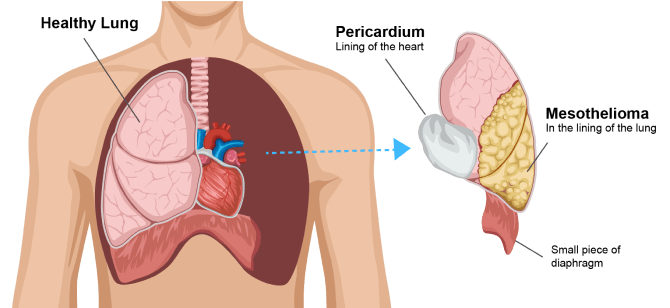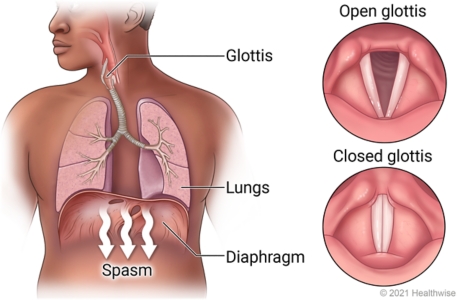Mesothelioma cancer is caused by exposure to asbestos. Asbestos is a naturally occurring mineral that was widely used in building materials, insulation, and other products due to its heat resistance and durability.
What Is Mesothelioma Cancer
Mesothelioma cancer is caused by exposure to asbestos. Asbestos is a naturally occurring mineral that was widely used in building materials, insulation, and other products due to its heat resistance and durability. When asbestos fibers are inhaled or ingested, they can become lodged in the mesothelial lining of the lungs, abdomen, or heart, leading to inflammation and the development of cancerous cells. The risk of developing mesothelioma is directly related to the amount and duration of asbestos exposure.
People who work in industries where asbestos was commonly used, such as shipbuilding, construction, and mining, are at a higher risk of developing mesothelioma.
Additionally, family members of asbestos workers have also been found to have an increased risk of developing mesothelioma due to secondhand exposure to asbestos fibers.
Mesothelioma Cancer Causes:
Exposure to asbestos:
Asbestos is a naturally occurring mineral that was widely used in building materials, insulation, and other products due to its heat resistance and durability. When asbestos fibers are inhaled or ingested, they can become lodged in the mesothelial lining of the lungs, abdomen, or heart, leading to inflammation and the development of cancerous cells.
Occupational exposure in certain industries:
People who work in industries where asbestos was commonly used, such as shipbuilding, construction, and mining, are at a higher risk of developing mesothelioma.
Secondhand exposure to asbestos:
Asbestos fibers can be brought home on the clothing and hair of workers, exposing family members to the carcinogenic fibers. Family members of asbestos workers have also been found to have an increased risk of developing mesothelioma due to secondhand exposure to asbestos fibers.
Prolonged and high-level exposure to asbestos fibers:
The risk of developing mesothelioma is directly related to the amount and duration of asbestos exposure. The longer and higher the exposure, the more likely it is for the person to develop mesothelioma.
Inhaling or ingesting asbestos fibers:
Asbestos fibers can be inhaled or ingested when asbestos-containing materials are disturbed, damaged or degraded. This can cause the fibers to become lodged in the mesothelial lining of the lungs, abdomen, or heart leading to inflammation and the development of cancerous cells.
Asbestos fibers lodged in mesothelial lining:
When asbestos fibers are inhaled or ingested, they can become lodged in the mesothelial lining of the lungs, abdomen, or heart. The mesothelial lining is a protective layer that surrounds the internal organs and when asbestos fibers are lodged in it, it causes inflammation, which over time can lead to the development of cancerous cells. This inflammation can cause the cells to multiply and divide uncontrollably, forming tumors that can invade and damage surrounding tissue.
Latency period:
Mesothelioma has a long latency period, which means that symptoms may not appear for many years after the initial exposure to asbestos. It can take anywhere from 20 to 50 years for the symptoms of mesothelioma to appear. This makes it difficult to diagnose cancer in its early stages and often results in a poor prognosis for patients.
Different types of Mesothelioma:
There are three main types of mesothelioma, each of which affects a different area of the body: pleural mesothelioma affects the lining of the lungs, peritoneal mesothelioma affects the lining of the abdomen, and pericardial mesothelioma affects the lining of the heart. Each type of mesothelioma has its own set of symptoms and treatment options.
Mesothelioma Cancer Symptoms Early
Importance of early detection:
Early detection and treatment of mesothelioma are crucial for improving the chances of survival. Regular check-ups and screenings for people who have a history of exposure to asbestos are recommended in order to catch the disease in its early stages. Additionally, people who are experiencing symptoms such as chest or abdominal pain, shortness of breath, or fluid buildup should see a doctor to be evaluated for mesothelioma.
Symptoms Of Mesothelioma Cancer
Mesothelioma symptoms can vary depending on the type of mesothelioma and the location of cancer within the body. Some common symptoms of mesothelioma include:
Pleural Mesothelioma:
- Chest pain or discomfort
- Shortness of breath
- Persistent cough
- Fatigue
- Hoarseness
- Weight loss
- Swelling of the face and arms
Peritoneal Mesothelioma:
- Abdominal pain or swelling
- Nausea
- Loss of appetite
- Fatigue
- Weight loss
Pericardial Mesothelioma:
- Chest pain
- Shortness of breath
- Rapid heartbeat
- Swelling of the legs
- Fatigue
Pleural Mesothelioma Symptoms:
Pleural mesothelioma, which affects the lining of the lungs, can cause a range of symptoms related to the chest and lungs. Some common symptoms of pleural mesothelioma include:
Chest pain or discomfort:
Pain in the chest can be caused by the tumors growing in the pleural lining and can be worsened by breathing or coughing.
Shortness of breath:
As the tumors grow, they can press against the lungs and make it difficult to breathe.
Persistent cough:
A persistent cough can be caused by tumors or by fluid buildup in the pleural space.
Fatigue:
Cancer and treatment can take a toll on the body, leading to feelings of fatigue.
Hoarseness:
As the tumors grow, they can press against the nerves that control the vocal cords, leading to hoarseness.
Weight loss:
Cancer and its treatment can cause weight loss.
Swelling of the face and arms:
As the tumors grow, they can press against the veins in the chest, leading to swelling in the face and arms.
Peritoneal Mesothelioma Symptoms:
Peritoneal mesothelioma, which affects the lining of the abdomen, can cause a range of symptoms related to the abdomen and stomach. Some common symptoms of peritoneal mesothelioma include:
Abdominal pain or swelling:
Cancer can cause pain or discomfort in the abdomen, as well as swelling due to fluid buildup.
Nausea:
Cancer and its treatment can cause nausea.
Loss of appetite:
Cancer and its treatment can cause a loss of appetite.
Fatigue:
Cancer and treatment can take a toll on the body, leading to feelings of fatigue.
Weight loss:
Cancer and its treatment can cause weight loss.
Pericardial Mesothelioma Symptoms:
Pericardial mesothelioma, which affects the lining of the heart, can cause a range of symptoms related to the heart and chest. Some common symptoms of pericardial mesothelioma include:
Chest pain:
Cancer can cause pain or discomfort in the chest.
Shortness of breath:
As the tumors grow, they can press against the heart and make it difficult to breathe.
Rapid heartbeat:
As the tumors grow, they can press against the heart and lead to a rapid heartbeat.
Swelling of the legs:
As the tumors grow, they can press against the veins in the chest, leading to swelling in the legs.
Fatigue:
Cancer and treatment can take a toll on the body, leading to feelings of fatigue.
It’s important to note that these symptoms can also be caused by other conditions, so it’s important to see a doctor if you have any concerns. A combination of diagnostic tests, including imaging scans, biopsies, and blood tests, can be used to make a definitive diagnosis of mesothelioma.
Treatment Of Mesothelioma Cancer
Treatment for Mesothelioma cancer causes:
Surgery For Mesothelioma Cancer:
Surgery is often used to remove as much of the tumor as possible. The type of surgery used will depend on the location and stage of cancer. For pleural mesothelioma, a pleurectomy and decortication may be performed, in which part of the pleural lining and affected lung tissue is removed. For peritoneal mesothelioma, debulking surgery may be performed, in which as much of the tumor as possible is removed.
Radiation Therapy For Mesothelioma Cancer:
Radiation therapy uses high-energy beams to kill cancer cells. It may be used before or after surgery to shrink tumors and kill any remaining cancer cells.
Chemotherapy For Mesothelioma Cancer:
Chemotherapy uses drugs to kill cancer cells. It may be used before or after surgery to shrink tumors and kill any remaining cancer cells. It can also be used to help with symptoms and to prolong survival in advanced cases.
Immunotherapy For Mesothelioma Cancer:
Immunotherapy is a type of treatment that helps the body’s immune system fight cancer. It uses substances made by the body or made in a laboratory to boost, direct, or restore the body’s natural defenses against cancer.
Palliative Care For Mesothelioma Cancer:
Palliative care is specialized medical care that focuses on providing relief from the symptoms and stress of a serious illness like mesothelioma. The goal is to improve the quality of life for both the patient and the family.
It’s important to note that the best treatment plan will depend on the stage, location, and cell type of cancer as well as the patient’s overall health and preferences.
A team of specialists, including a surgeon, oncologist, and radiation therapist, will work together to develop a treatment plan that is tailored to the individual patient.
Is Mesothelioma Always Fatal?
Prognosis:
Mesothelioma is a serious and often fatal disease. The prognosis for mesothelioma depends on a number of factors, including the stage of cancer, the cell type, and the patient’s overall health. In general, the prognosis is poorer for patients with advanced-stage disease and for those with more aggressive cell types.
Survival Rates:
The overall survival rate for mesothelioma is low, with most patients living less than one year after diagnosis. However, survival rates vary depending on the stage of cancer at diagnosis and the patient’s overall health.
Factors that affect survival:
Some factors that affect the survival of mesothelioma include the stage of cancer, the cell type, and the patient’s overall health. Factors that can improve survival include early diagnosis, aggressive treatment, and being treated by a team of specialists experienced in treating mesothelioma.
Clinical Trials:
Clinical trials are research studies that test new treatments for mesothelioma. They offer patients the opportunity to receive new treatments that are not yet widely available. They also help researchers learn more about the disease and how to treat it.
It’s important to note that mesothelioma is a rare disease and the prognosis varies greatly depending on the stage and cell type of cancer and the overall health of the patient. With recent advancements in treatment options and clinical trials, there is hope for patients with mesothelioma. However, early diagnosis is crucial for better treatment outcomes.
Conclusion:
“Mesothelioma is a rare and aggressive type of cancer that affects the lining of the lungs, abdomen, and heart. It is caused by exposure to asbestos, and symptoms include chest pain, shortness of breath, and weight loss. Treatment options include surgery, radiation therapy, and chemotherapy, but the prognosis is generally poor due to the advanced stage at which the cancer is often diagnosed. Early detection and prevention through asbestos awareness and regulations are crucial in reducing the incidence of mesothelioma.”




